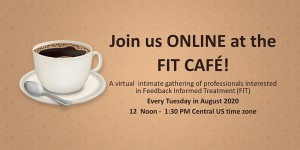 First, the coronavirus outbreak. Then the lockdown, followed by an ever-rising number of deaths and catastrophic economic fallout — and just when the tide seemed to be turning, George Floyd was murdered in Minneapolis resulting in nationwide protests and unrest.
First, the coronavirus outbreak. Then the lockdown, followed by an ever-rising number of deaths and catastrophic economic fallout — and just when the tide seemed to be turning, George Floyd was murdered in Minneapolis resulting in nationwide protests and unrest.
I don’t recall a time in recent memory when events were evolving as rapidly and in so many different directions as they are now.
With so much happening, you can’t be faulted for having your attention on matters other than work and professional development. Back in March, my colleague, Cynthia Maeschalck and I began offering a series of free “meetups and discussions” for mental health professionals interested in feedback informed treatment (FIT) and deliberate practice (DP). The response surprised both of us, with each webinar filling within hours of being announced.
Soon, people began emailing us backchannel. Three themes were prominent. The first was requests for additional webinars. The second was for opportunities for more personalized consultation. Third, and finally, was an interest in tips about how to get back “on track” with FIT and DP for both individuals and agencies.
Well, as the saying goes, “Ask and you will receive.”
In case you haven’t been able to secure a spot during one of the live broadcasts, I’ve just uploaded the fourth “FIT & DP Meetup & Discussion.” Watch it below. As before, we cover a lot of ground. You can listen to the entire recording or use the guide below to jump ahead to the material of interest to you (Yes, CE’s are available if desired by CEunits.com. Click on the link below the video for more information):
- How do you sustain your interest in FIT and deliberate practice? (2:29)
- Is it possible to use one measure across different contexts and client presenting problems? (12:07; continued at 24:09)
- What is the best way to implement FIT as an individual practitioner? (19:00)
- How often should the ORS and SRS be administered? (27.18; continued 50:15)
- How can the ORS be used to determine the dose and intensity of treatment? (28.20; continued 31:15)
- Using the Group Session Rating Scale (30:12)
- Understanding and using the clinical cutoff as feedback in psychotherapy (38.30)
- What does it cost to implement FIT? (41:36)
- What is most important when you first start using FIT? (52:25)
If you’re looking for opportunities for more individualized consultation regarding your use of FIT or DP, I’ve just announced the “FIT Cafe” — four intimate, online gatherings limited to 10 participants. It’s B.Y.O.Q., so “Bring Your Own Questions” and I’ll provide the food for thought and practice. Click here to register.
— four intimate, online gatherings limited to 10 participants. It’s B.Y.O.Q., so “Bring Your Own Questions” and I’ll provide the food for thought and practice. Click here to register.
And how about those needing help getting back on track? ICCE Certified Trainer, Stacy Bancroft addresses the subject directly in a new interview with psychologist Susanne Bargmann — another in a series of videos aimed at helping practitioners “stay FIT” in the current practice environment.
OK, that’s it for now. The foregoing should keep you busy and productive for a while!
Scott
Scott D. Miller, Ph.D.
Director, International Center for Clinical Excellence

Leave a Reply